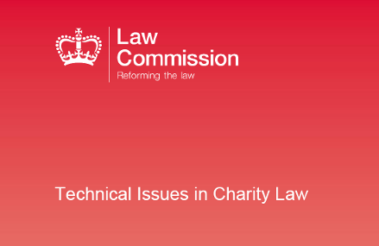Charity trustees will have more freedom over how to use surplus fundraising and permanent endowments, under legal changes announced today.
They are among the changes promised by the government in response to recommendations made by the Law Commission in 2017.
However, ministers rejected other recommendations from the Commission, including reforms which would have made it easier for to challenge judgments by the Charity Commission.
Baroness Barran, minister for civil society, said in a foreword to the response that the government had accepted in principle “the vast majority” of the commission’s recommendations “and will look to implement them when parliamentary time allows”.
Surplus funds
The Law Commission made 43 recommendations, of which the government accepted or partially accepted all but six.
In the event that people give to fundraising campaigns which either miss their target or raise more than was expected, charities will now be able to keep donations of up to £120 without involving the regulator. Under current rules, trustees must seek a donor’s permission about what to do with the gift.
The government’s response said: “We agree that the requirement for a general charitable intention should be retained to protect donor autonomy.
“We agree with the Law Commission that a fair balance should be struck between protecting donors’ wishes and the administrative burden of contacting donors to offer a refund.”
Trustees could also use those funds for “new purposes” but would need to contact the Charity Commission where they came to more than £1,000.
Borrowing and investing
The government also agreed to rules simplifying the rights of trustees to release money from permanent endowments and invest those endowments.
The Law Commission had recommended that trustees have statutory powers to borrow from charities’ permanent endowment, allowing them to spend up to 25% of the value of the permanent endowment subject so long as that spending is recouped within 20 years. It also said that trustees should be free to make investments from endowments “with a negative or uncertain financial return”.
The government described the changes as “useful additions to trustees’ existing toolbox in seeking to further their charity’s purpose, whilst protecting the enduring nature of permanent endowment”.
Other changes
Other reforms include reviewing financial reporting thresholds, to ensure that they take into account inflation, and making it easier to amend governing documents.
Charities will also be able to access more advice on land transactions, although land sales must still be advertised to protect against communities losing local assets.
New rules will mean trustees can be paid when they provide goods to their charity, and in some cases the Charity Commission will have powers to make charities pay trustees in the event of a dispute.
No reforms to appeals process
However, the government rules out reviewing charities’ right of appeal against decisions made by the Charity Commission, saying that existing rules “were all carefully considered in terms of who could exercise them, in what circumstances, and the appropriate remedies in each case. We have no plans to review these”.
The government also rejected a recommendation to allow charities to appeal directly to the courts for authorisation to pursue charitable proceedings, arguing that such appeal should still go directly to the Charity Commission. The regulator would be expected to take steps to guarantee there was no conflict of interest.
Related articles











